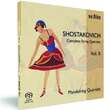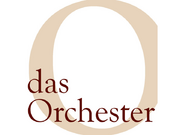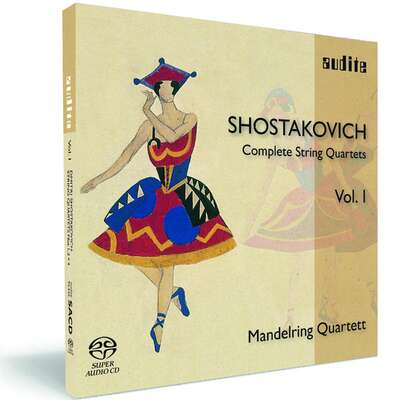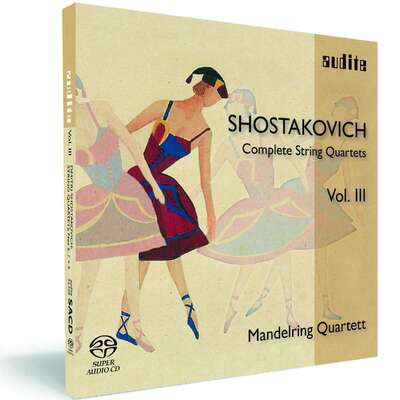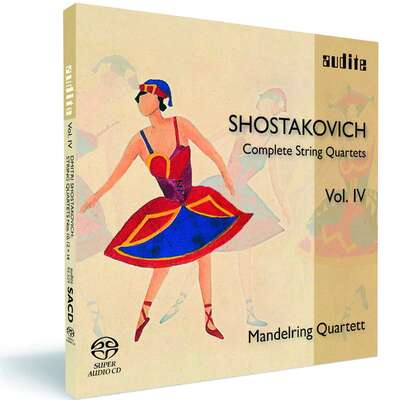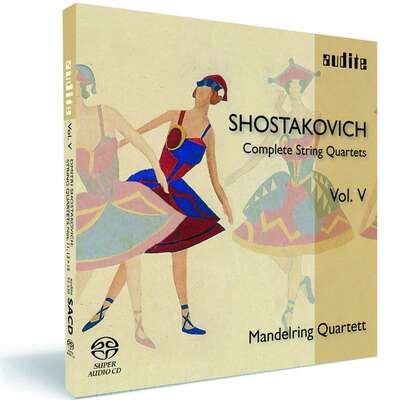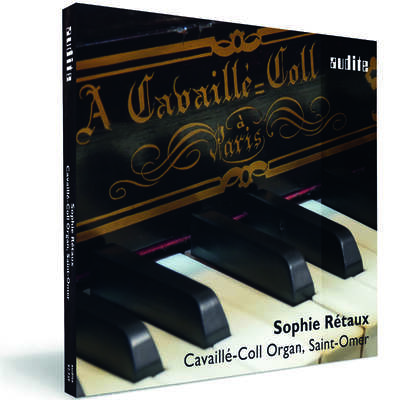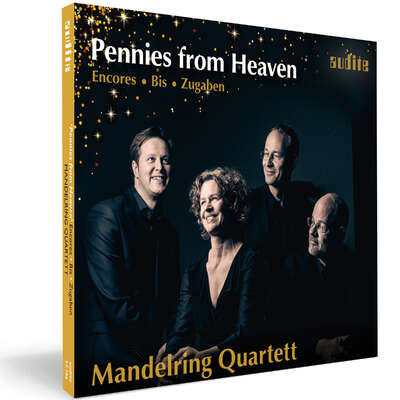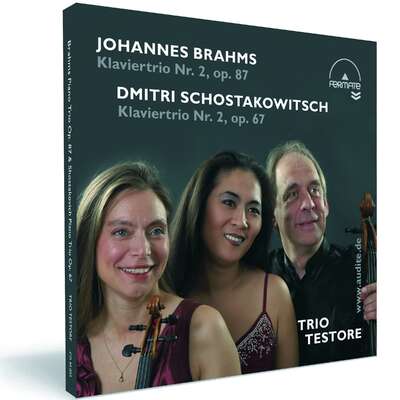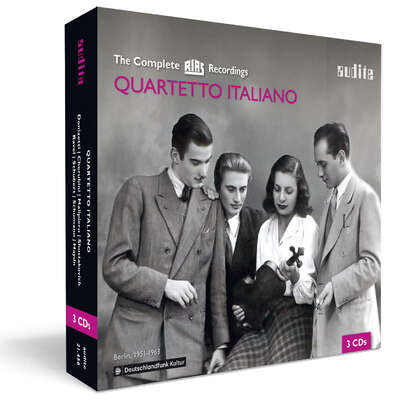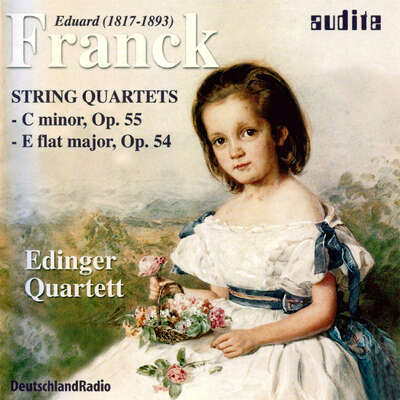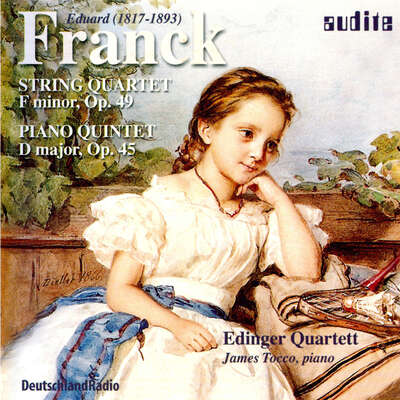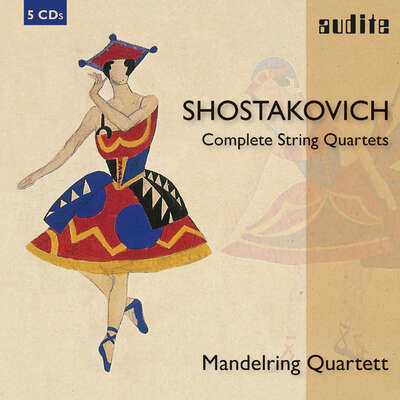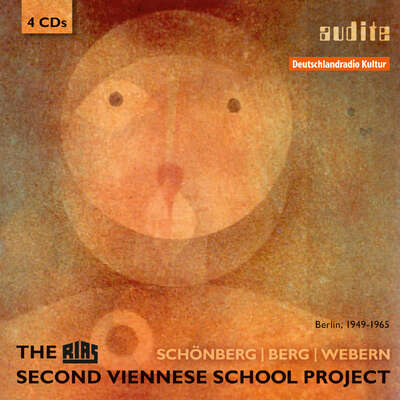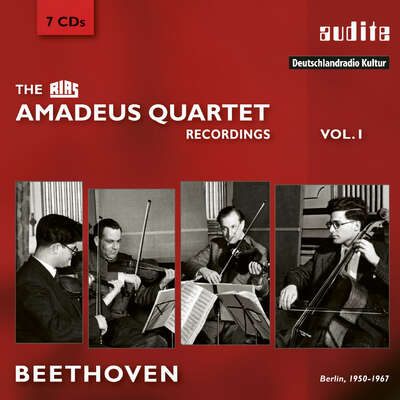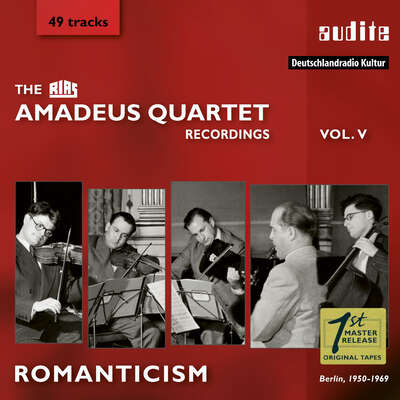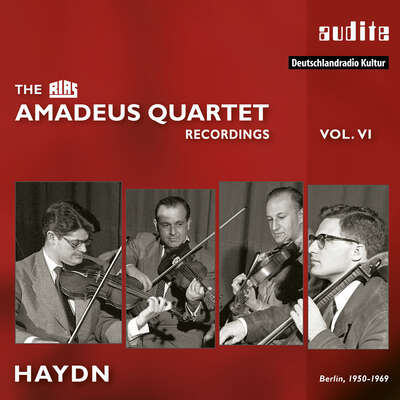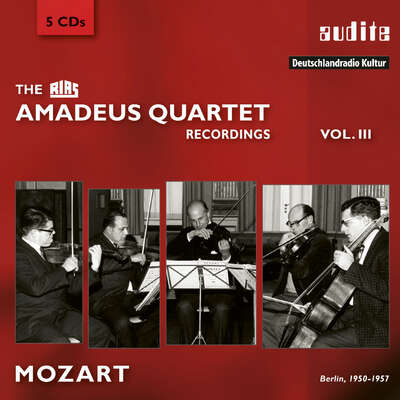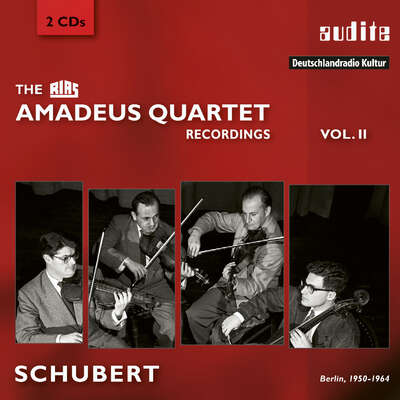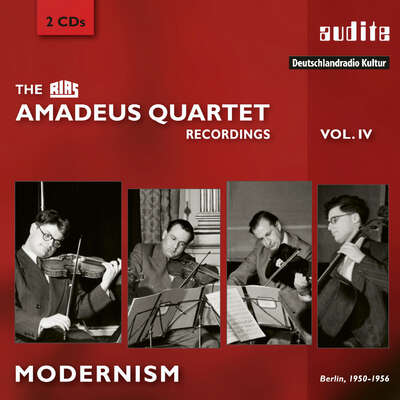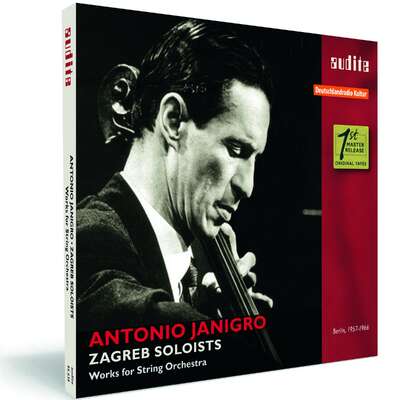
Following the release of the Mandelring Quartet 's highly acclaimed first volume of the Complete String Quartets of Dmitri Shostakovich , they have now recorded a second volume containing another three. Here again the ensemble addresses the overwhelming intensity of Shostakovich's music with...more
"Outstanding Shostakovich from the Mandelring - In this second volume of Shostakovich's quartets, the Mandelring Quartet makes it abundantly clear that it is building one of the outstanding cycles in today's catalogue. The sound engineer's exemplary internal balance earns the final accolade." (The Strad)
Details
| Dmitri Shostakovich: Complete String Quartets Vol. II | |
| article number: | 92.527 |
|---|---|
| EAN barcode: | 4022143925275 |
| price group: | ACX |
| release date: | 18. April 2007 |
| total time: | 69 min. |
Bonus Material
Informationen
Following the release of the Mandelring Quartet's highly acclaimed first volume of the Complete String Quartets of Dmitri Shostakovich, they have now recorded a second volume containing another three. Here again the ensemble addresses the overwhelming intensity of Shostakovich's music with maximum commitment and commanding expressive power without neglecting its intimate and lyrical aspects.
Quartet No. 8 confirmed Shostakovich's status as a composer of chamber music once and for all. With this five-movement work, composed in just a few days during a visit to the German Democratic Republic, the composer was writing a kind of requiem for himself, replete with quotations from his most important works. He was 53 at the time, and could look back on a turbulent life which for two decades was deeply marked by a battle of wills with Stalin, the Soviet dictator - a trauma which remained with Shostakovich till the end of his life. Further stages in his project to come to terms with the quartet genre are evident in Quartet No. 3 (1946) and Quartet No. 6 (1956), two works which chart his achievement in steering a path between folk music and baroque techniques and reconciling the trauma of war with the reconstruction taking place during the "thaw" which followed Stalin's death.
Shostakovich's 15 quartets represent an imposing body of work. His range and encyclopaedic command of the medium are without parallel in twentieth-century music.
Reviews
SWR | SWR 2 Musikstunde, Freitag, 23.11.2012, 9.05 - 10.00 Uhr | Ulla Zierau | November 23, 2012 "Mein Herz ist zerrissen" – Musik aus Momenten tiefster Trauer (5)
[…]<br /> Vielleicht hätte Dmitrij Schostakowitsch sein 8. StreichquartettMehr lesen
Vielleicht hätte Dmitrij Schostakowitsch sein 8. Streichquartett
Sikorski | August 2010 | August 1, 2010 Gesamteinspielung der Schostakowitsch-Quartette durch das Mandelring Quartett komplett
Die späten Streichquartette von Dmitri Schostakowitsch fallen in eineMehr lesen
concerti - Das Berliner Musikleben | Mai 2010 | Ulrike Klobes | May 1, 2010
Gemeinsam den Emotionen nachgehen
Das Mandelring Quartett und sein Berlin-Zyklus im Kammermusiksaal
Neustadt an der Weinstraße – von Berlin aus nicht gerade einMehr lesen
Universitas | Nr. 2/2010 | Adelbert Reif | February 1, 2010
Über den Grad der Bedeutung von Dmitri Schostakowitsch (1906-1975) fürMehr lesen
Diverdi Magazin | 189 / febrero 2010 | Pablo-L. Rodríguez | February 1, 2010
Shostakovichfest
El cuarteto Mandelring culmina una impresionante integral Shostakovich en Audite
El termino “Hausmusik” alude a la música pensada para su interpretación en casa por la familia y los amigos con el fin de entrerenerseMehr lesen
La carrera del Mandelring Quartett despegó en 1991 cuando ganaron en Munich el concurso internacional de música del ARD, el concurso Evian o se alzaron tres anos más tarde con el Premio “Paolo Borgiani" en Reggio Emilia. En esos años iniciaron también su carrera fonográfica en el sello Largo con la integral de los cuartetos de Berthold Goldschmidt (1903-1996), el último de los cuales les esta dedicado. Su siguiente proyecto lo realizaron enere 1992 y 2003 en el sello CPO y supuso la recuperación del noneto. uno de los 37 quinteros y nueve de los 34 cuartetos dei compositor francés Georges Onslow( 1784-1853). Y es que los cuatro miembros del Mandelring Quartett están profundamente implicados en dar rienda suelta a su curiosidad a la hora de diseñar provectos interesantes tanto para ellos como para los promotores v el publico. Precisamente el interés de I.udger Böckenhoff por ampliar el sello Audite, que había lanzado en 2000, a grandes proyectos fonográficos hizo que el Mandelring Quartett pasase a formar parce de su escuderla. Inicialmenre planificaron una integral de los cuartetos de Schubert que ha quedado detenida desde 2005 tras tres lanzamientos y que se ha combinado con un interesante proyecto iniciado en 2004 y concluido en 2007 de grabar los cuartetos de Brahms junto a otros de amigos y defensores suyos como Félix Otto Dessoff, Friedrich Gernsheim o Heinrich von Herzogenberg. No obstante, el provecto más prestigioso del Mandelring Quartett, y más aclamado por la prensa internacional, es la intergral de los cuartetos de Dimitri Shostakovich que iniciaron en 2006 y que acaban de concluir tras cinco lanzamientos.
El interés de estos cinco SACDs (a los que se añade el referido DVD con el segundo) no sólo reside en la calidad musical, sino también en la técnica. Creo que estamos ante la primera integral de los cuartetos del compositor sanpeterburgués en sonido envolvente y, si a ello le añadimos la marca de calidad sonora de Böckenhoff (que ya hemos comentado en estas páginas en relación con el cofre dedicados a las grabaciones de Furtwängler para la RÍAS: véase Boletín n° 181, págs. 38-39), el resultado no puede ser más satisfactorio a la hora de disfrutar con impresionante equilibrio, espacialidad y precisión de todos los detalles de cada interpretación. Estos cinco discos contienen una visión completamente nueva, donde cada uno de los cuatro músicos busca su personalidad sin detrimento del conjunto, sumamente intensa (el manejo de las tensiones es impresionante en algunas obras) y con un extraordinario predominio de la claridad formal (se consiguen versiones muy equilibradas), tímbrica (toda una lección de manejo del fraseo y de diferentes tipos de vibrare o golpes de arco) y dinámica (hay constrastes ciertamente de impacto) de estas quince obras excepcionales de la literatura para dieciséis cuerdas.
Cada lanzamiento incluye alguna versión excepcional e incluso el orden de su publicación resulta sumamente interesante para la escucha de todo el ciclo. El primer volumen se inicia con una versión fascinante de ese personalísimo divertimento shostakovichiano que es el Primer cuarteto o el Segundo impresiona por su mezcla de virtuosismo y entonación. El volumen dos resulta algo menos convincente pues se adopta un acercamiento cómodo y menos implicado; el Tercer cuarteto esta admirablemente locado (impresionante desarrollo fugado del primer movimiento) pero le falta humor negro. Su versión desgarradora de principio a fin del Octavo, que ha sido criticada por algunos por su enfoque de los dos últimos movimientos, puede resultar comprensible; recordemos que escuchamos a un cuarteto alemán en una efigie fúnebre personal compuesta tras una visita a Dresde en 1960. El tercer volumen, que incluye los retratos de las tres mujeres más importantes en la vida del compositor (su primera esposa Nina en el Séptimo, su segunda esposa Irina en el Noveno o su amante la compositora Galina Ustvolskaya en el Quinto) supera las trallas del anterior, al ahondar con mayor acierto en la uniformidad de los tempi (los lentos no demasiado lentos y los rápidos con más intensidad que velocidad), algo que, por cierto, también hacía el Cuarteto Beethoven que estrenó estas tres obras; de este lanzamiento Norberto Tauste publicó una breve reseña en el Boletín n° 174, pag. 53. El cuarto volumen sigue el camino ascendente marcado por el anterior con una versión del Décimo cuarteto admirablemente equilibrada de carácter y ahondando en los contrastes (excelente aquí la passacaglia) o un Duodécimo de corte intimista y profundizando en los coqueteos dodecafónicos del compositor ruso. Finalmente, el quinto volumen plasma con sorprendente precisión y riqueza de matices todas las caras de la muerte; resulta un digno colofón para este verdadero Shostakovichfest y culmina con una versión del Quincuagésimo cuarteto completamente personal y fascinante en esa sucesión de reflexiones funerarias contenidas en seis movimientos lentos.
Die Rheinpfalz | Mittwoch, 27. Januar 2010 Nr. 22 | Frank Pommer | January 27, 2010
Verstörte Seele
Angespielt: Das Neustadter Mandelring-Quartett beendet beeindruckend seinen fünfteiligen Schostakowitsch-Zyklus
Das Neustadter Mandelring-Quartett genießt dank seiner Konzerte und weitMehr lesen
www.sikorski.de | Januar 2010 | - | January 15, 2010 Gesamteinspielung der Schostakowitsch-Quartette durch das Mandelring Quartett komplett
Die späten Streichquartette von Dmitri Schostakowitsch fallen in eineMehr lesen
Die Zeit | 26. November 2009, Die Zeit Nr. 49 | Volker Hagedorn | November 26, 2009
Das heimliche Tagebuch
Nirgendwo wird Dmitri Schostakowitsch so persönlich wie in seinen 15 Streichquartetten. Das Mandelring Quartett legt eine eindrucksvolle Gesamtaufnahme vor
Mit 66 Jahren fing das Leben vielleicht für Udo Jürgens an, aber nichtMehr lesen
Neue Zeitschrift für Musik | 4/2009 | Thomas Schulz | July 1, 2009
Die Streichquartette Dmitri Schostakowitschs enthalten vielleicht dasMehr lesen
Das Orchester | 11/2008 | Werner Bodendorff | November 1, 2008
Neun der insgesamt fünfzehn Streichquartette von Dmitri SchostakowitschMehr lesen
Frankfurter Allgemeine Zeitung | 19. Juli 2008 | Gerhard Rohde | July 19, 2008
Das Quartett als Spiegel der Welt
Dmitri Schostakowitsch hat in seinen fünfzehn Streichquartetten eine Art Tagebuch verfasst aus dunkler Zeit. Jetzt ist die Gesamtausgabe mit dem Mandelring Quartett komplett
Zu den Phänomenen der gegenwärtigen Musik, auch des Musikbetriebs,Mehr lesen
International Record Review | June 2008 | Peter J. Rabinowitz | June 1, 2008
In the disjointed Portrait DVD that comes as a bonus with this CD (the second instalment of a new Shostakovich cycle), members of the MandelringMehr lesen
Indeed, like everything I’ve heard from this foursome, these readings reveal an emotional reticence backed by a remarkable uniformity of tone and vision, most obviously audible in exceptional balances (note how vividly they present the fugal writing in development of the Third Quartet’s first movement), in a seamless coherence whenever material is passed from one instrument to another, and in an unfaltering accord about the way each detail contributes to the music’s emotional trajectory. In terms of dynamic control and tonal nuance, this is surely one of the most refined quartets of its generation; and in those flickering moments of untroubled lyricism (more frequent in the Sixth Quartet than in the Third or Eighth) and in the haunting morendo endings that round out each of these works, their performances stand up to any.
Their finesse, however, is apt to cushion Shostakovich’s violent jolts (say, the stark hammer blows in the third movement of the Third or the fourth movement of the Eighth) and to mitigate the music’s vein of desolation (surely, the first violin’s laments in the fourth movement of the Third need to be bleaker). For all the beauty of the performances, then, the music’s emotional reach seems both distorted and constricted. The Mandelring certainly don¹t convey the sense of unrelenting grief in the Sixth’s third-movement passacaglia, for instance, and they substitute consolation for despair in the finale to the Eighth. The music¹s variety of utterance is muted, too: long-range changes in mood are generally well handled (note how steadily they build to the climax of the fourth movement of the Sixth), but quicker shifts in spirit are often underplayed.
In the end, then, these are comfortable readings that offer a very partial view of the repertoire. I much prefer the more extroverted, hyperbolic style that marks the Kopelman Quartet’s Third or the more rugged approach that the Borodin Quartet take to all three of these quartets. If you favour your Shostakovich on the sweeter side, however, you may well find the Mandelring appealing, especially given the first-rate engineering and the generally informative notes.
ionarts.blogspot.com | Thursday, May 29, 2008 | jfl | May 29, 2008 Shostakovich with the Mandelring Quartett
Shostakovich’s String Quartets are, alongside those of Bartók, Villa-Lobos, and possibly Bloch, the towering [20th century] achievements in thatMehr lesen
Just as it has become the norm for every better orchestra to record a Mahler symphony cycle in the last ten years, it’s part of the good tone for aspiring and established string quartets to delve into Shostakovich cycles. After the pioneering Beethoven (Legendary Treasure), Shostakovich (Regis), Fitzwilliam (Decca), and Borodin String Quartets (an early cycle on Chandos Historical and a complete one on Melodiya) had completed their cycles, there was little to challenge the primacy especially of the latter two until the Emerson String Quartet darted into the relative void with their squeaky clean, live cycle from Aspen on DG. Since then complete cycles have been added by the Brodsky (Warner), Sorrel (Chandos), St. Petersburg (Hyperion), Éder (Naxos), Rubio (Brilliant), Manhattan (Ess.a.y), Danel (Fuga Libera), and Rasumovsky (Oehms, not yet available)Quartets.
One of the most exciting prospects for a cycle of Shostakovich quartets these days is the Israeli-Russian Jerusalem Quartet. They have two recordings of DSCH out, so far, and the leisurely pace seems to be beneficial to the project, assuming a whole cycle is planned. Definitively planning a complete cycle is the Mandelring Quartett from Germany who have arrived on volume three of five of their multi-channel SACD project. I have enjoyed them live and on disc – and in particular their innovative Brahms cycle - coupled with neglected contemporaries like Dessoff – has piqued my interest.
The first two instalments of this group, consisting of the siblings Sebastian, Nanette, and Bernhard Schmidt (violins and cello, respectively) as well as violist Roland Glassl, have already picked up several recommendations – promises of excellence that the third, which includes String Quartets nos. 5, 7, and 9, seems to hold.
Serving as my primary comparison for these recordings is the second Borodin cycle – newly re-mastered and released on Melodiya and more than ever my favorite for the emotional grit and grip that they exude. The sound, formerly “good enough”, is now very fine indeed; the background hiss audible, but even on headphones never intrusive – a definite improvement on the old BMG-distributed cycle.
String Quartet no.7, a sorrowful little number dedicated to the memory of his first wife Nina Vassilyevna Shostakovich who had died of cancer in 1954, is – in the inimitably translated liner notes of the Melodiya release – “a more little of all Shostakovich’s quartets. But there’s said a lot – and said newly.”. Indeed. The opening movement (Allegretto) has a light flexibility, deliberate elasticity with the Mandelring Quartett (3:34); the Borodin is notably faster (3:19) with more anguished peaks. The Hagen Quartett, whose latest disc includes this quartet (as well as nos.3 and 8), is more like spun silver threads; a perfection of individual voices.
The slow Lento movement highlights the Hagen’s individual excellence and separation again – whereas the Mandelrings sound a little hazier. But whereas the Hagens are utterly gloomy here, catching a grove only very late in the shortest of movements (2:46 with the Hagen, 2:52 with the Mandelring, and 3:34 with the Borodin), the Mandelring is comparatively bright. The Hagen Quartet seems to celebrate slacking dystopia and shapelessness, the Mandelring finds more purpose. Neither could possibly sustain the movement over three and a half minutes in the way that the Borodin does, without ever dropping the musical thread. Their take is not gloomy but steady – offering a constantly moving pulse throughout, lyrical toward the end, and almost unnoticeably slow.
Even the speedy and wild(er) third movement – Allegro – has a dark, melancholic, even lethargic undertone, a trace that all the busyness on the surface cannot dispel. It’s not unlike the 8th Symphony, in a way, but a merciful 50 minutes shorter. The Mandelring (5:11) buzz along with abandon and the superb sound on this Audite disc comes to the fore, especially where Bernhard Schmidt’s cello gets all the room to bloom that it needs. Just one detail, a possible caveat: alone, they sound pretty nice, even at the densest and wildest moments. Cut to the Borodin (at 5:35 again the slowest of the three) – and you notice the difference. The latter rip into the music with more pointed accentuation and a gusto that seems to put their poor instruments in immediate danger.
At high volumes the Mandelring quartet sounds weighty and beautiful, the Borodin shrill to the point of unbearable. Which of these two you find a recommendation or warning in a Shostakovich quartet will depend entirely on what it is that you want to get out of these works. If you have made proper acquaintance with them, you will undoubtedly have a preference already. The Hagen (5:16), not unlike the Borodin, but with frightening assuredness and accuracy, instead of frighteningly free-wheeling, rip through the first three minutes like the half-demented.
Judging by the Seventh Quartet, one might expect the Fifth Quartet to be something slightly mellower in the hands of the Mandelring Quartett by comparison with the Borodin’s version. Instead, they bulldoze through the opening Allegro non troppo with an intensity that rivals the Borodin every step of the way. Only at their wildest moments – this time due to the better, fuller sound, not because of lacking aggressiveness – are they less shrill than the Borodin’s who have the more delicate, even sweet, moments in the gentle, pizzicato-dominated closing pages.
In String Quartet no.9, the Borodin are at their most bracing. Perhaps this has to do with the fact that – like Quartet no.6 and the Piano Quintet with Sviatoslav Richter – it was recorded live. Some additional background noise, more reverberation and curious balances make the difference between Audite’s impeccable and Melodiya’s raw sound far more notable.
Listen to the third movement (Allegretto furioso), where the Mandelring Quartett doesn’t gallop into this movement like mad, as does the Borodin Quartet. Rather it starts as a graceful, agile dance, replaced by sudden vigour and anxious terror. The Borodin move from madly riveting to a brutal, metallic harshness that disabuses the listener of the idea that this might be the “Quartet for Children” that Shostakovich had promised the Beethoven Quartet for their 40th anniversary. Unless the same misunderstanding regarding “Toys and spending time in the open air” occurred here as it did in his 15th Symphony – distinctly not a toy-shop symphony, despite Shostakovich’s claims to that effect – the 1964 9th String Quartet is in fact a different, new work than the one he promised to produce with those words in 1952. You could also consider a link between the reoccurring galloping spiccato beat of the Allegretto to the “William Tell” quotes in the 15th Symphony, but if the similarity is anything but coincidental would be difficult to prove. When it finally saw the light, Shostakovich dedicated the quartet to his new, third, wife, Irina Supinskaya.
When anxiety and strife give way to the agonizing Adagio, the calm deliberation and the atmospheric sound of the Mandelring Quartet (3:03) are every bit as raw and tender as the much slower Borodin (4:04). Their concluding Allegretto is a strident highpoint of this release.
The peaks and extremes of the Borodin, not to mention the frequently abrasive sound – which I find quite appropriate most of the time – make that cycle stand out more and may be more immediately captivating or exciting. But especially on repeat- and closer listening, the Mandelring’s carefully considered, always unpredictable ways are a treasure, not only for audiophiles but for all who want more than the “authentic Russian” version of the Borodin, Beethoven, or Shostakovich Quartets.
American Record Guide | January/February 2008 | Vroon | January 1, 2008
The first is simple to review, because it is so different from all other recordings. There are no slow movements here. Markings like Adagio, Lento,Mehr lesen
So: do you want to hear Shostakovich done that way? I compared with the Jerusalem Quartet on Harmonia Mundi and the Eder Quartet on Naxos, and I am sure I do not want to hear it this way. Nor does the SACD sound make the slightest difference: I prefer the sound of both the others. This may be the first Shostakovich quartet series on SACD, but that doesn't matter. I see that another ARG reviewer rejected their earlier recording (of 1, 2, and 4) because they lack the darkness and intensity Shostakovich needs (Nov/Dec 2006). Right.
The Jupiter Quartet is less technically precise than the Mandelring and more emotionally involved. I find the playing rough and hardhitting. I want more beauty, more vibrato, a more refined sound. The sound is also too close-up. At least the Adagio is an adagio. In fact, tempos are rather slow, but with such strong (even brutal) attacks it seems faster. The Eder on Naxos will give you the best Shostakovich Quartet 3 you can hear.
Rhein-Neckar-Zeitung | Donnerstag, 13. Dezember 2007 | MR | December 13, 2007 Kraftvoll intelligent
In der zweiten Folge ihrer Einspielung der Schostakowitsch-StreichquartetteMehr lesen
CD Compact | Noviembre 2007 | Benjamin Fontvella | November 1, 2007
No me resulta nada fácil dar un juicio objetivo de esto disco. Es elMehr lesen
klassik.com | Oktober 2007 | Aron Sayed | October 16, 2007 | source: http://magazin.k... Kalte Tänze
Mit der CD-Reihe ‘Brahms und seine Zeitgenossen’ sowie mitMehr lesen
Le Monde de la Musique | Septembre 2007 | Patrick Szersnovicz | September 1, 2007
Chostakovitch était a l'avantgarde par ses structures melodiques et conservateur par son attachement a la mélodie, a une époque ou l'on étaitMehr lesen
Pour ce deuxième volume d'une future intégrale, le Quatuor Mandelring – jeune formation allemande qui a déjà signe de remarquables CD consacres a Brahms et surtout a Schubert – fait montre d'appréciables qualités factuelles, particulièrement dans une lecture sobre et raffinée du Sixième Quatuor. Si la vision un rien trop « constructiviste », du Troisième Quatuor peut séduire, elle manque de profondeur. L'interprétation du Huitième Quatuor vaut pour sa maîtrise instrumentale, malgre un jeu un peu trop uniforme.
Fono Forum | 9/2007 | Thomas Schulz | September 1, 2007 Gefährdet
Wie schon in der ersten Folge ihrer Gesamteinspielung der Schostakowitsch-Quartette legt das Mandelring-Quartett packende Interpretationen vor. EsMehr lesen
Pizzicato | 9/2007 | Guy Wagner | September 1, 2007 Musikalische Wahrheit
Im April 2006 hatte ich bei der Besprechung der ersten CD der Integrale der Streichquartette von Shostakovich mit dem Mandelring Quartett geschrieben:Mehr lesen
Die Karlsruher Musiker Sebastian und Nanette Schmidt, Violinen, Bernhard Schmidt, Cello, (drei Geschwister) und Roland Glassl, Viola, über die eine Gratis Portrait-DVD interessante Auskünfte gibt, gehen in der neuen Einspielung noch über das bereits Erreichte hinaus. Dabei werden sie wiederum optimal von einer außergewöhnlichen Aufnahmequalität unterstützt: transparenter und packender könnte der Klang nicht sein.
Vor allem aber ist es die profunde geistige Dimension von Shostakovichs Musik, die offen gelegt wird. Hier geschieht ein Eindringen in die tiefsten Tiefen dieser Kompositionen. Jeder Satz erhält seine individuelle Charakterisierung, jede Stimmung wird ausgeleuchtet, jeder Kontrast ist bis zur letzten Konsequenz durchgespielt. Beispiel: das 3. Quartett F-Dur op. 73. Wie die fast fröhlich anmutenden Ambiance des Beginns plötzlich wie 'weggefegt' ist (Michael Struck-Schloen im exzellenten Begleittext), das macht stutzig, lässt aber die seelischen Zweifel und die geradezu physischen Ängste einsichtig werden, die der Komponist insbesondere in den beiden Moderato-Sätzen ausdrückt. Noch einmal spiegelt dieses Werk die ganze Kriegsbrutalität so kurz nach den tragischen Ereignissen zurück (man darf nicht vergessen, dass es 1946 entstand), um in völliger Entrücktheit zu enden. Und diese ist hier perfekt verwirklicht.
Ähnliches kann man auch über das zehn Jahre später entstandene 'Tauwetter'-Quartett G-Dur op. 101 sagen, dessen Stimmungsschwankungen so etwas wie eine Hoffnung des Komponisten auf bessere Tage für sein Land und sich selbst ausdrücken.
Höhepunkt aber wird die Interpretation des berühmtesten aller Shostakovich-Quartette, des 8. in c-Moll, op.110, das der Meister als ein Requiem für sich selbst ansah und das ambivalent bleibt, sowohl in seiner Widmung ("an die Opfer des Faschismus und des Krieges"), als in seiner sehr subjektiven Aussage (schließlich war Shostakovich auch ein 'Opfer'): Immer wieder führt er sein Ton-Monogramm D-Es-C-H an, um zu sagen: Hier bin ich und kann nicht anders.
Das Überraschendste an der Interpretation des Mandelring Quartetts ist dann aber, wie 'schön' sie ist, trotz aller Zerrissenheit, Trauer, Klage, Verzweiflung, die das Werk ausdrückt. Fast schon zum Weinen schön. So wirkt musikalische Wahrheit.
The Strad | August 2007 | David Denton | August 1, 2007 Outstanding Shostakovich from the Mandelring
In this second volume of Shostakovich's quartets, the Mandelring QuartetMehr lesen
opushd.net - opus haute définition e-magazine | numéro 31 | Jean-Jacques Millo | July 18, 2007
Dans ce second volet de l’intégrale des Quatuors à Cordes de DimitriMehr lesen
Partituren | Juli/August 2007 | Georg Rudiger | July 1, 2007
Bei seiner zweiten Schostakowitsch-Einspielung beschreitet das Mandelring Quartett einen langen Weg, der das Ensemble vom heiter verspielten KopfsatzMehr lesen
Muzyka21 | czerwiec 2007 | Stanisław Lubliński | June 1, 2007
Mandelring Quartett idzie od sukcesu do sukcesu. W maju br. ich pierwszyMehr lesen
www.SA-CD.net | May 1, 2007 | Andrew B | May 1, 2007
This recording of the 8th quartet might receive some contrastingMehr lesen
NDR Kultur | 23. März 2007 | Elisabeth Richter | March 23, 2007
„Frei und eigenverantwortlich musizieren und dabei die aufregendsten Entdeckungen machen, jedes Jahr das Repertoire erweitern, mit Partnern auchMehr lesen
Sie begeistern ihr Publikum aber nicht nur in ihren Konzerten, sondern viele ihrer CDs wurden prämiert: Schuberts Streichquartette erhielten etwa den Preis der Deutschen Schallplattenkritik. Auch die neue Serie, die Gesamtaufnahme sämtlicher Quartette von Dmitri Schostakowitsch ist preisverdächtig. Vol. 2 ist gerade fertig geworden. Elisabeth Richter hat es für uns gehört.
[Musik 1, Quartett 6, 1. Satz]
Man hört es vom ersten Ton an. Hier spielen Musiker, die tief in die Materie eingedrungen sind, und die Freude daran haben, dem Hörer davon zu erzählen, nicht akademisch, sondern mit Lust und Laune und mit Ernsthaftigkeit.
[Musik 1, Quartett 6, 1. Satz]
Volume 1 der Aufnahmen sämtlicher Schostakowitsch-Quartett war schon vielversprechend, und auch die Quartette Nr. 3, 6 und 8 von Volume 2 beweisen das außerordentliche Niveau der vier „Mandelring-Musiker“. Dass der Klang so genau ausbalanciert ist, Kraft in den wild-rasenden Passagen des achten Quartettes etwa hat, oder ganz geheimnisvoll entrückt und sphärisch wirkt wie im Moderato des dritten Quartetts, das kommt vielleicht daher, dass im Mandelring Quartett drei Geschwister spielen.
[Musik 2, Quartett 3, 2. Satz]
Zusätzlich zur CD gibt es eine DVD, wo das Mandelring Quartett portraitiert wird. Da erlebt man die Musiker bei der Probe, im Konzert, beim gemeinsamen Essen und unterwegs. Und man erfährt, wie sich Bratschist Roland Glassl als Nicht-Familienmitglied im Quartett fühlt.
[Musik 2, Quartett 3, 3. Satz]
Schostakowitsch’ Quartette jedenfalls zeigt das Mandelring Quartett wie unter einem Brennglas, sehr klar werden die kompositorischen Strukturen vermittelt, man balanciert das stets Groteske und Bedrohliche bei Schostakowitsch, das neben vermeintlich Banal-Heiterem steht, mit Verstand und Feingefühl aus. Man weiß um die Abgründe und Schönheiten dieser Musik, verliert sich aber nicht in ihnen.
Image Hifi | 3/2013 | Heinz Gelking Dmitri Schostakowitsch: Streichquartett Nr. 8 in c-moll, op. 110
Das Zerrissene, die Wut, die Trauer werden gleichwohl herausgearbeitet. Aber vor allem tritt ein neues Bild von Schostakowitsch zutage: Das eines Komponisten, der gegenüber Glikman auch von der "wunderschönen Klarheit der Form" seines Quartetts schwärmte und dem es neben aller Bekenntnishaftigkeit sehr wohl darum ging, einen hochwertigen Beitrag zur Königsgattung klassischen Komponierens zu leisten. Die SACD aus dem Jahr 2007 klingt natürlich besser als die bis hierhin vorgestellten CD-Produktionen.Mehr lesen
News
Dmitri Schostakowitsch: Streichquartett Nr. 8 in c-moll, op. 110
"Mein Herz ist zerrissen" – Musik aus Momenten tiefster Trauer (5)
Gesamteinspielung der Schostakowitsch-Quartette durch das Mandelring Quartett komplett
Gesamteinspielung der Schostakowitsch-Quartette durch das Mandelring Quartett komplett
Über den Grad der Bedeutung von Dmitri Schostakowitsch (1906-1975) für die...
Die Streichquartette Dmitri Schostakowitschs enthalten vielleicht das Beste, mit...
In the disjointed Portrait DVD that comes as a bonus with this CD (the second...
Neun der insgesamt fünfzehn Streichquartette von Dmitri Schostakowitsch hat das...
The first is simple to review, because it is so different from all other...
Chostakovitch était a l'avantgarde par ses structures melodiques et...
Dans ce second volet de l’intégrale des Quatuors à Cordes de Dimitri...
No me resulta nada fácil dar un juicio objetivo de esto disco. Es el segundo de...
Bei seiner zweiten Schostakowitsch-Einspielung beschreitet das Mandelring...
Mandelring Quartett idzie od sukcesu do sukcesu. W maju br. ich pierwszy wolumin...
This recording of the 8th quartet might receive some contrasting views. - First...
„Frei und eigenverantwortlich musizieren und dabei die aufregendsten...
